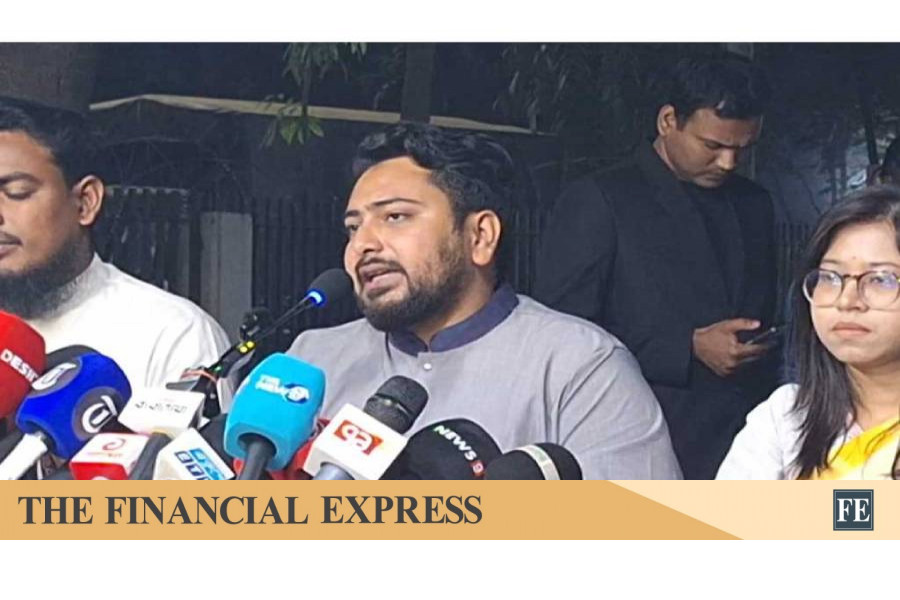Saif
Senior Member
- Joined
- Jan 24, 2024
- Messages
- 17,262
- Likes
- 8,334
- Nation

- Residence

- Axis Group


Nahid says NCP is ‘fully committed’ to executing July Charter
National Citizen Party (NCP) Convenor Nahid Islam has expressed full confidence in the implementation of the July National Charter following the formation of the new government. Speaking on Monday, a day before the BNP assumes power, Nahid signed the Charter in the presence of Chief Advisor Muhamm
Nahid says NCP is ‘fully committed’ to executing July Charter
bdnews24.com
Published :
Feb 16, 2026 22:05
Updated :
Feb 16, 2026 22:05

National Citizen Party (NCP) Convenor Nahid Islam has expressed full confidence in the implementation of the July National Charter following the formation of the new government.
Speaking on Monday, a day before the BNP assumes power, Nahid signed the Charter in the presence of Chief Advisor Muhammad Yunus at the State Guest House Jamuna.
Asked whether he harboured any doubts about the Charter’s enforcement, Nahid said: “We see no doubt remaining. This election itself is based on a popular vote, grounded in the July National Charter order.
“Without this order, neither this election nor this government would have been possible. To ensure the next parliament and government function legitimately, the Charter must be implemented according to the people’s mandate.”
Representing the NCP, Nahid and Member Secretary Akhter Hossen signed the July Charter without issuing any note of dissent.
“The note of dissent was resolved through the popular vote. The Charter clearly specifies which reforms each party will undertake, which have unanimous agreement, and which are mandated by the people’s decision, such as proportional representation in the Upper Chamber and appointments of election commissioners,” Nahid added.
The July Charter, originally demanded at the end of 2024 by leaders of the July Uprising to seize the opportunity for reform, was developed through extensive dialogue, incorporating both consensus and limited dissent.
On Oct 17, 2025, 24 political parties, including the BNP and Jamaat-e-Islami, signed it at the South Plaza of parliament, along with Yunus and members of the National Consensus Commission.
The NCP had participated in the dialogue but initially refrained from signing, citing the lack of a clear legal basis.
Nahid said, “At the time of signing, the document was only symbolic. With the legal framework now established through the July National Charter order and reflected in the people’s vote, our original objectives are achieved.
“Signing now is a formality to ensure implementation without hesitation from any party.”
bdnews24.com
Published :
Feb 16, 2026 22:05
Updated :
Feb 16, 2026 22:05
National Citizen Party (NCP) Convenor Nahid Islam has expressed full confidence in the implementation of the July National Charter following the formation of the new government.
Speaking on Monday, a day before the BNP assumes power, Nahid signed the Charter in the presence of Chief Advisor Muhammad Yunus at the State Guest House Jamuna.
Asked whether he harboured any doubts about the Charter’s enforcement, Nahid said: “We see no doubt remaining. This election itself is based on a popular vote, grounded in the July National Charter order.
“Without this order, neither this election nor this government would have been possible. To ensure the next parliament and government function legitimately, the Charter must be implemented according to the people’s mandate.”
Representing the NCP, Nahid and Member Secretary Akhter Hossen signed the July Charter without issuing any note of dissent.
“The note of dissent was resolved through the popular vote. The Charter clearly specifies which reforms each party will undertake, which have unanimous agreement, and which are mandated by the people’s decision, such as proportional representation in the Upper Chamber and appointments of election commissioners,” Nahid added.
The July Charter, originally demanded at the end of 2024 by leaders of the July Uprising to seize the opportunity for reform, was developed through extensive dialogue, incorporating both consensus and limited dissent.
On Oct 17, 2025, 24 political parties, including the BNP and Jamaat-e-Islami, signed it at the South Plaza of parliament, along with Yunus and members of the National Consensus Commission.
The NCP had participated in the dialogue but initially refrained from signing, citing the lack of a clear legal basis.
Nahid said, “At the time of signing, the document was only symbolic. With the legal framework now established through the July National Charter order and reflected in the people’s vote, our original objectives are achieved.
“Signing now is a formality to ensure implementation without hesitation from any party.”






































